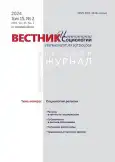Professional and educational orientations of students as an indicator of subjectivity in the field of higher education (on the example of universities in Nizhny Novgorod)
- Autores: Fatenkov A.N.1,2, Sitnikova I.V.1
-
Afiliações:
- Lobachevsky State University of Nizhny Novgorod
- Privolzhskiy Research Medical University
- Edição: Volume 15, Nº 2 (2024)
- Páginas: 132-150
- Seção: Problems of Education and Upbringing in Modern Russia
- URL: https://journal-vniispk.ru/2221-1616/article/view/271692
- DOI: https://doi.org/10.19181/vis.2024.15.2.9
- EDN: https://elibrary.ru/GDNIPL
- ID: 271692
Citar
Texto integral
Resumo
Using a questionnaire survey, we studied the motivations of students at leading universities in the city regarding obtaining higher education, choosing a university and the direction of training, as well as preferences regarding their future field of activity. As a result of the analysis, five groups of students with different motivational guidelines were identified. Three groups with a clear, fully realised vocational and educational strategy: with a focus on the demand for the profession in the labour market, on the advantages of higher education as such, on the realisation of their own abilities and inclinations (the latter is defined by the authors as an “authentically subjective group”). And two groups - with a vague, not quite consciously built professional and educational trajectory (with a drift from the pole of subjectivity to the pole of mediation). As a result of the study, a conclusion was made that the level of subjectivity among modern students is not high enough, and the social reason for this insufficiency is indicated.
Sobre autores
Aleksey Fatenkov
Lobachevsky State University of Nizhny Novgorod;Privolzhskiy Research Medical University
Email: fatenkov@fsn.unn.ru
ORCID ID: 0000-0001-8628-2413
Código SPIN: 6226-1098
Doctor of Philosophical Sciences, Professor of Department of Industry and Applied Sociology, Lobachevsky State University of Nizhny Novgorod, Nizhny Novgorod, Russia; Professor of the Department of Social Sciences and Humanities, Privolzhskiy Research Medical University, Nizhny Novgorod, Russia Nizhny Novgorod, Russia
Irina Sitnikova
Lobachevsky State University of Nizhny Novgorod
Email: april@fsn.unn.ru
ORCID ID: 0000-0002-8138-3116
Código SPIN: 6437-9284
Candidate of Sociological Sciences, Associate Professor, Department of Industry and Applied Sociology Nizhny Novgorod, Russia
Bibliografia
- Бачишин В. М., Разин П. В., Владимирова М. Б. Метод анализа текстов массового сознания (МАТЕМС) (на основе научного семинара Б.А. Грушина на факультете журналистики МГУ им. М. В. Ломоносова 1983–1989 гг.) // Мониторинг общественного мнения: экономические и социальные перемены. 2020. № 1. С. 455–464. doi: 10.14515/monitoring.2020.1.19; EDN: QEFFNI.
- Бодрийяр Ж. Общество потребления: его мифы и структура / Пер. с фр. Е. А. Самарской. М.: Республика: Культурная революция, 2006. 268 с.
- Горшков М. К., Шереги Ф. Э. Молодежь России в зеркале социологии. К итогам многолетних исследований. М.: ФНИСЦ РАН, 2020. 688 с. doi: 10.19181/monogr.978-5-89697-325-6.2020; EDN: BNSNDA.
- Дебрэ Р. Введение в медиологию / Пер. с франц. Б. М. Скуратова. М.: Праксис, 2010. 368 с.
- Константиновский Д. Л., Вознесенская Е. Д., Чередниченко Г. А. Молодежь России на рубеже XX–XXI веков: образование, труд, социальное самочувствие. М.: ЦСПиМ, 2014. 548 с.
- Образование в цифрах: 2023: краткий статистический сборник. М.: ИСИЭЗ ВШЭ, 2023. 132 с.
- Рабочая сила, занятость и безработица в России (по результатам выборочных обследований рабочей силы). 2022. Стат. сб. М.: Росстат, 2022. URL: https://rosstat.gov.ru/storage/mediabank/Rab_sila_2022.pdf (дата обращения: 22.12.2023).
- Российский статистический ежегодник. 2020: Стат. сб. Раздел 5. Труд. Занятость и безработица. М.: Росстат, 2020. URL: https://rosstat.gov.ru/storage/mediabank/Ejegodnik_2020.pdf (дата обращения: 22.12.2023).
- Ситникова И. В. Профессиональное самоопределение студенчества: мотивационно-ценностный аспект // Известия высших учебных заведений. Поволжский регион. Общественные науки. 2021. № 2(58). С. 83–99. doi: 10.21685/2072-3016-2021-2-9; EDN: APOXWA.
- Ситникова И. В. Современное студенчество: особенности профессионального выбора // Мат. IX международной социологической Грушинской конференции «Социальная инженерия: как социология меняет мир», Москва, 20–21 марта 2019 г. / Отв. ред. А. В. Кулешова. М.: ВЦИОМ, 2019. С. 304–308. EDN: ALBBOR.
- Терентьев К. Ю. Образовательные стратегии российской молодежи: к построению типологии // Вестник СПбГУ. Сер. 12. Социология. 2016. Вып. 2. С. 17–27. doi: 10.21638/11701/спбу12.2016.202; EDN: YNLBUZ.
- Фатенков А. Н. Субъект: парадигма возвращения // Человек. 2011. № 5. С. 5–20. EDN: OIXRST.
- Фатенков А. Н. Феномен выбора под подозрением // Человек. 2016. № 3. С. 48–62. EDN: WKTZVR.
- Хакен Г. Синергетика / Пер. с англ. В. М. Емельянова; под ред. Ю. Л. Климантовича, С. М. Осовца. М.: Мир, 1980. 404 с.
- Weidlich W., Haag G. Opinion Formation – an Elementary Example of SemiQuantitative Sociology // Weidlich W., Haag G. Concepts and Models of a Quantitative Sociology: The Dynamics of Interacting Populations. Berlin; Heidelberg: Springer, 1983. P. 18–53.
Arquivos suplementares









